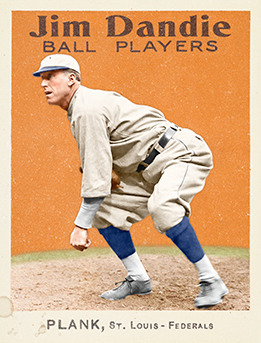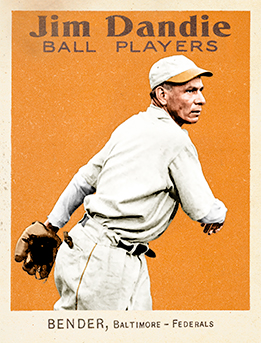- Series: Jim Dandie Feds
- City: St. Louis
- Team: Terriers
- League: Federal League
- Hall: National Baseball Hall of Fame
Edward Stewart Plank (1875-1926) hurled more shutouts and complete games than any other lefthander in his 17-season career. He ranks behind only Warren Spahn and Steve Carlton among southpaws in wins. Signed by Connie Mack straight out of college, Plank never played a day in the minors. Playing in 4 Series for Philadelphia, Plank had an ERA of 1.32 but got no run support, going 2-5 but finishing all six of his starts.
- His 326 wins ranks 13th on the all time list. He had eight 20-win seasons
- At the end of his career, played for St. Louis in the Federal League’s final year in 1915 and then with the Browns for two more
- Elected to Hall of Fame: 1946
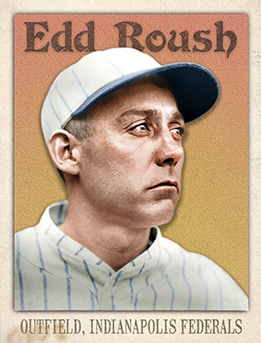
- Series: Diamond Heads '15
- City: Indianapolis
- Team: Hoosiers (FL)
- League: Federal League
- Hall: National Baseball Hall of Fame
Edd J. Roush (1893-1988) was an Indiana farm boy who knew his own mind. He built a Hall of Fame career on doing things his way. Spring training? Not for Edd, he stayed in shape. Use a bat heavier than any other player? Why not? His farm-bred arm strength allowed him to hit the ball wherever he chose with the weight of the bat doing most of the work. Stand still in the box awaiting the pitch? Not for Edd. He'd move his feet after the ball left the pitcher's hand, positioning himself according to his read. Endure management's miserly ways? No, Edd would hold out every year for a fairer contract. He'd skip to pirate leagues (the Federals) if necessary to find a better salary, something he had done as a school-boy player in Hoosier country and continued throughout his long and storied major league tenure. It took a few years in the bigs and a curious impatience by renowned manager John McGraw to get Edd to Cincinnati and the stage on which he would set records. Twice he edged out Rogers Hornsby for batting titles. He led the Reds to the Series championship in 1919, only to have that accomplishment tarnished by scandal. There is little doubt he was right in asserting that his club was better than Chicago's and really won it fair and square. During his twelve years with the Reds, Roush's batting average was .331. He never struck out more than 25 times in a season. He was fast on the bases and a terror in center, regarded as perhaps the premier defender of the Dead Ball era with Tris Speaker the competition.
- McGraw sent young Edd from the Giants to Cincy in 1916 along with two other future Hall-of-Famers: Bill McKechnie and Christy Mathewson. Matty was tickled to get a manager position and Edd and Bill were thrilled to get out from under the tough taskmaster McGraw
- When Edd threw out the ball at the last game played at Crosley Field, Joe Morgan said Roush was “the best of us all.”
- Elected to Hall of Fame: 1962
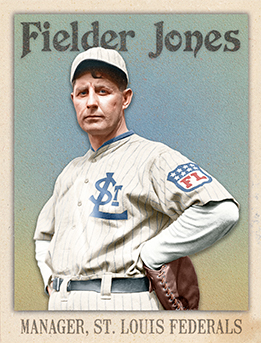
- Series: Diamond Heads '15
- City: St. Louis
- Team: Terriers
- League: Federal League
Fielder Allison Jones (1871-1934) made his name in baseball's history books by eking just enough results from minimal production to win the White Sox their first Series title in 1906. That club has forever been known as the “Hitless Wonders,” a squad of light-hitting scrappers who, under Jones' able direction, were able to best the powerful Cubs. The '06 Series was noteworthy as the first cross-town matchup and the only one to pair the Chicago franchises. It was also one of the greatest upsets, with the Cubs' bats held in check by Ed Walsh and other Sox hurlers. In taking the final two contests, Jones' crew stepped out of character and rapped 26 hits. Overall, though, his boys lived up to their “hitless” reputation, managing only a .198 average for the series. Jones was one of the most adept managers of his era in teaching “inside baseball” or “small-ball” whereby his charges frequently plated runs without the benefit of hits in the inning. Jones was a blue-blood, tracing his heritage to Scotland's Robert Bruce on one side and a Mayflower landing on the other. He had university training that perhaps predicted the cerebral approach Fielder always brought to the game. He had come out of rural Pennsylvania to play for Brooklyn where he helped the team to pennants in 1899 and 1900. Moving to Chicago only continued his winning ways, gaining another gonfalon in 1901, the new American League entry's first. As a player, Fielder had made a fine record, leading the Superbas in 1900 and hitting .285 overall.
- Jones moved from Chicago to St Louis when the Federal League and the Terriers beckoned him back to the majors in 1914 and he remained with the Browns through the 1918 season
- Though the White Sox were a poor hitting team in '06, they had come a long way under Jones' leadership. A writer of the day lauded him as having introduced “speed, psychology and daring into the game.”
- Series: Jim Dandie Feds
- City: Baltimore
- Team: Terrapins
- League: Federal League
- Hall: National Baseball Hall of Fame
Charles Albert Bender (1884-1954) won 212 games en route to a Hall of Fame career. He began life amid the abject poverty of a Minnesota reservation, was mentored by Pop Warner at the Carlisle Indian School and hit the majors with a bang for the Athletics in 1903. “Albert” as Connie Mack called him, beat future Hall members Cy Young and Clark Griffith compiling 17 wins in his rookie season. He led the league 3x in win percentage but was at his best under pressure. In 5 World Series, Bender won 6 games with a 2.44 ERA and completed 9 of his 10 starts.
- Connie Mack said that of all his players he would most trust Bender to win in the clutch
- Admired for his brilliance, Ty Cobb dubbed him the most intelligent pitcher he ever faced
- Elected to Hall of Fame: 1953
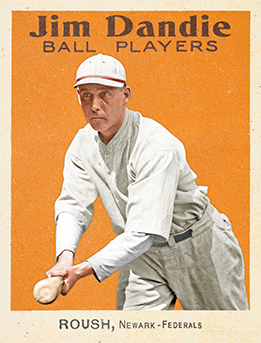
- Series: Jim Dandie Feds
- City: Newark
- Team: Peppers
- League: Federal League
- Hall: National Baseball Hall of Fame
Edd J. Roush (1893-1988) was an Indiana farm boy who knew his own mind. He built a Hall of Fame career on doing things his way. Spring training? Not for Edd, he stayed in shape. Use a bat heavier than any other player? Why not? His farm-bred arm strength allowed him to hit the ball wherever he chose with the weight of the bat doing most of the work. Stand still in the box awaiting the pitch? Not for Edd. He'd move his feet after the ball left the pitcher's hand, positioning himself according to his read. Endure management's miserly ways? No, Edd would hold out every year for a fairer contract. He'd skip to pirate leagues (the Federals) if necessary to find a better salary, something he had done as a school-boy player in Hoosier country and continued throughout his long and storied major league tenure. It took a few years in the bigs and a curious impatience by renowned manager John McGraw to get Edd to Cincinnati and the stage on which he would set records. Twice he edged out Rogers Hornsby for batting titles. He led the Reds to the Series championship in 1919, only to have that accomplishment tarnished by scandal. There is little doubt he was right in asserting that his club was better than Chicago's and really won it fair and square. During his twelve years with the Reds, Roush's batting average was .331. He never struck out more than 25 times in a season. He was fast on the bases and a terror in center, regarded as perhaps the premier defender of the Dead Ball era with Tris Speaker the competition.
- McGraw sent young Edd from the Giants to Cincy in 1916 along with two other future Hall-of-Famers: Bill McKechnie and Christy Mathewson. Matty was tickled to get a manager position and Edd and Bill were thrilled to get out from under the tough taskmaster McGraw
- When Edd threw out the ball at the last game played at Crosley Field, Joe Morgan said Roush was “the best of us all.”
- Elected to Hall of Fame: 1962
